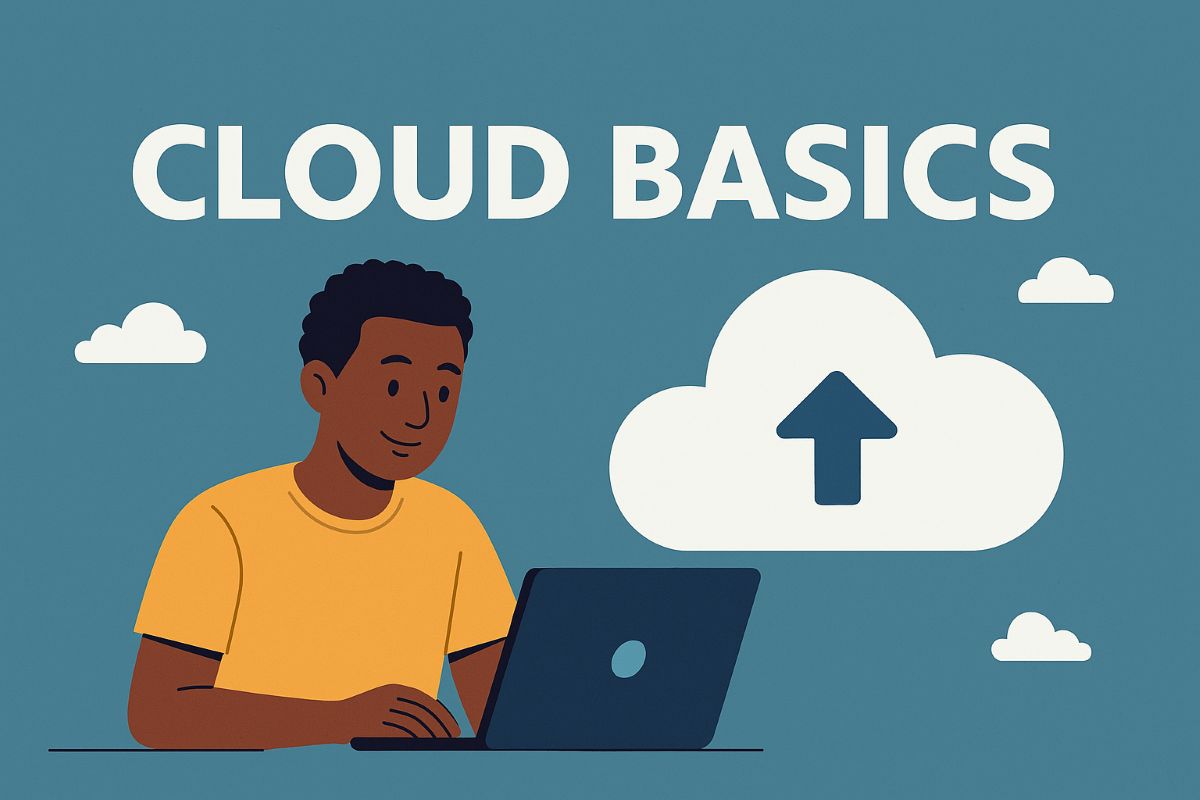
What Does “Cloud” Mean?
The “cloud” refers to a network of powerful remote servers hosted on the internet that store and manage data and applications. These servers are often maintained by big companies like Microsoft, Google, or Amazon.
Instead of installing Word or Excel on one computer, cloud services like Microsoft 365 let you use them from a browser — anywhere, anytime.
Why Cloud Computing Matters
✅ You can access files and apps from any device
✅ Teams can work together in real-time, even from different cities
✅ You don’t need to buy powerful hardware — just use online services
✅ Your files are backed up automatically
✅ Cloud providers update and protect your data with strong security
These benefits are especially useful in Ethiopian universities, startups, NGOs, and remote offices.
Key Features of Cloud Computing
On-demand access – Use resources whenever you need
Self-service – No need to wait for IT to set up apps
Scalability – Grow from one user to thousands easily
Pay-as-you-go – Only pay for what you use
Security – Data is encrypted, and systems are monitored 24/7
Automatic updates – Cloud providers update tools for you
Cloud Service Models (IaaS, PaaS, SaaS)
Cloud computing offers services in 3 main models:
IaaS (Infrastructure as a Service)
You rent virtual servers, networks, and storage
➤ Example: Microsoft Azure, AWS EC2
➤ Useful when you want full control of softwarePaaS (Platform as a Service)
You get a full development platform
➤ Example: Microsoft Power Platform, Azure App Services
➤ Good for building apps without managing serversSaaS (Software as a Service)
Ready-made apps over the internet
➤ Example: Microsoft 365 (Word, SharePoint), Google Workspace
➤ Ideal for general users, teams, students
For SharePoint and Power Platform users, SaaS and PaaS are most relevant.
Cloud Deployment Models
Cloud services can be delivered in different setups:
Public Cloud – Services shared over the internet (e.g., OneDrive, Gmail)
Private Cloud – Used by one organization only (e.g., government data center)
Hybrid Cloud – A mix of public and private (e.g., SharePoint Online + on-premises files)
Microsoft 365 uses a public cloud model, but can integrate with private storage.
Global Cloud Providers
Some of the biggest cloud service providers:
✅ Microsoft Azure
✅ Amazon Web Services (AWS)
✅ Google Cloud Platform (GCP)
✅ IBM Cloud
✅ Oracle Cloud
Microsoft Azure powers SharePoint Online, Power Platform, Teams, and OneDrive.
Cloud in Everyday Life (Ethiopia & Global)
Cloud services are already part of our daily life, often without us realizing:
📱 WhatsApp → Uses cloud to store messages and media
📷 Google Photos → Automatically backs up pictures
📧 Gmail/Outlook → Cloud-based email
📂 OneDrive/Dropbox → Cloud file storage
🧾 Telebirr & Banks → Store user data in the cloud
📚 University Portals → NEAEA, campus portals use cloud systems
Cloud Security Essentials
Security is the most critical part of cloud adoption. Leading providers use:
✅ Encryption – Data is scrambled and protected
✅ Firewalls – Block unauthorized access
✅ Access Controls – Only authorized users can view/edit
✅ Multi-Factor Authentication (MFA) – Adds an extra security layer
✅ Compliance – Providers meet global legal standards (ISO, GDPR)
As a SharePoint admin or Power Platform user, understanding roles and permissions is key.
Cloud Storage Basics
Cloud storage lets you save files on the internet instead of your computer.
✅ You can access files from any device
✅ Share files securely with others
✅ Recover files from the cloud even if your laptop breaks
Popular tools:
OneDrive → Integrated with SharePoint and Office apps
Google Drive → Works with Docs, Sheets, Slides
Dropbox → Easy sharing
iCloud → For Apple devices
With SharePoint, you can build document libraries stored in the cloud with version history and co-editing.
Cloud in Microsoft 365
Microsoft 365 is a cloud-based service that includes:
SharePoint Online
OneDrive
Microsoft Teams
Outlook
Word, Excel, PowerPoint (web versions)
Power Apps, Power Automate, Power BI
✅ Data is synced across all devices
✅ Accessible from browser or mobile app
✅ Files are stored in Azure datacenters
Benefits of Cloud for Ethiopian Organizations
✅ Universities can offer remote learning platforms
✅ NGOs can manage donor reports and project data
✅ Businesses can track sales, inventory, and staff
✅ Government offices can digitize services
✅ Freelancers can deliver and store work professionally
Challenges and How to Overcome Them
The Future of Cloud in Africa
Africa is seeing a rise in cloud adoption. Companies like Safaricom, Telebirr, Ethio Telecom, and CBE are moving to cloud for scalability and security.
Microsoft is also investing in Africa Data Centers, making services like SharePoint, Teams, and Power Platform faster and more secure for local users.
Cloud + Power Platform + SharePoint = Digital Transformation
✅ Use SharePoint to store documents in the cloud
✅ Use Power Apps to build cloud-connected mobile apps
✅ Use Power Automate to connect services (e.g., when a form is submitted, send an email)
✅ Use Power BI to pull data from SharePoint, Excel, or SQL and visualize it in reports
Together, they enable digital transformation in schools, health centers, NGOs, businesses, and government offices — all using the power of the cloud.
Comments (1)
Categories
Recent posts


Ethiopia University Exit Exam: What You ...
27 Jun 2023
Grade 12 Exam Preparation Ethiopia | ...
18 Mar 2025
How to Make Money Online in Ethiopia | ...
18 Mar 2025





Hi Adugna !
Endet nek? SharePoint memar efeligalehu